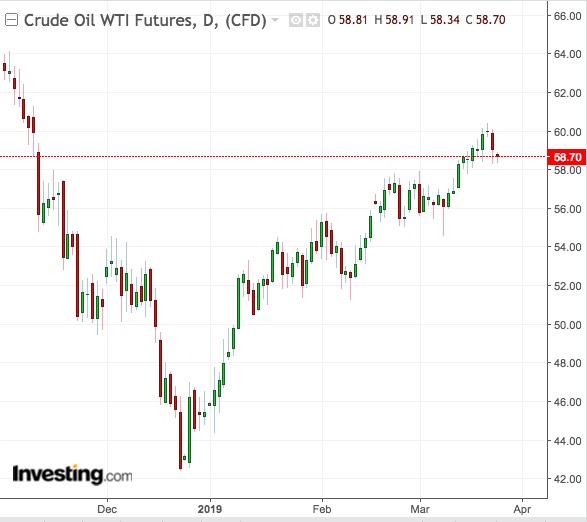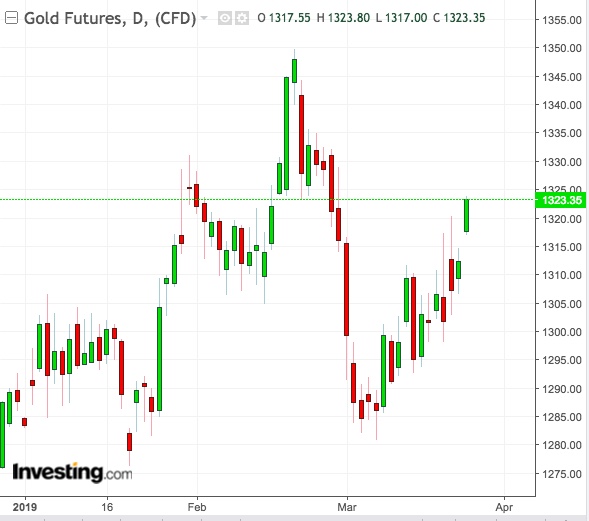Can a U.S. president with re-energized political fortunes add to this week’s dynamics in oil?
With all that’s going on to muddle crude’s fundamentals—from last week’s rally over deepening OPEC cuts to this week’s tottering start on U.S. recession fears—Donald Trump’s ostensibly improved chances for re-election in 2020, after being cleared of accusations in the Senate probe on Russia, cannot be discounted as a variable that might add to the immediate noise in oil.
U.S. Special Counsel Robert Mueller's conclusion that he could not find evidence that Trump colluded with Russia to win the presidency in 2016 takes away the central charge of campaign dishonesty that Democrats have flung at Trump for two years.
While that could be a powerful weapon for the president’s campaign next year—and the likelihood is he could milk that as early as Thursday at a rally in Grand Rapids, MI—analysts also say that Trump’s legal woes are likely to go beyond the Mueller report.
For now, it isn’t clear what a politically-reenergized Trump would do for oil. With the first newsbreak on Mueller’s findings emerging on Sunday, any market impact would likely be felt first on Wall Street when U.S. trading resumes on Monday.
Politically-Powerful Trump Paradox For Oil
A more politically-stable Trump could have a paradoxical effect on oil.
An administration strengthened by the president’s own standing could lend the political stability investors often crave in markets. The flip side from that, of course, is that the dollar could rise too, weighing on commodity prices, which typically move in the opposite direction of the greenback.
Also, Trump’s dislike for high oil prices is well known, as is his tendency to counter them with anything from discouraging tweets to Iranian import waivers—even emergency U.S. supply oil sales, if necessary.

On a high from his immediate victory over the Mueller probe, the president could be in the mood for another high-stakes battle with OPEC to try and subdue prices that hit four-month highs above $60 a barrel in the U.S. West Texas Intermediate crude last week, before economic concerns caused the market to dial back.
Since the year began, OPEC, or more precisely, Saudi Arabia, has gone on a collision course with the president, vowing not to back down with its production cuts that have added about 30% to WTI and Brent crude prices.
But Trump’s wins in forcing Beijing to come to terms with its trade-distorting practices could prompt the oil market to think the president might borrow a page or two from his China playbook to deal with OPEC—which is, essentially, a cartel that thinks of its own interests first.
Sinking Equities Might Be A Bigger Damper
If Monday’s early trend in equities is an indication, Trump might not have to do anything right away. Stocks opened sharply lower in Asia, pulling oil down too, on jitters over U.S. 10-year Treasury yields tumbling to early 2018 lows and below the three-month rate for the first time in 12 years. Adding to that was the sinking of manufacturing output data from Germany, Europe's biggest economy, for the third straight month.
The final reading of fourth-quarter U.S. GDP growth will be the main event for financial markets this week, as investors watch for further signals on the economy.
Dominick Chirichella, director of risk and trading for oil at the Energy Management Institute in New York, said in a weekend note:
“A broad sell-off in the global equity markets, prompted by the market interpreting the further flattening of the Treasury yield curve as a signal of recession on the way, means global oil demand could be slowing.”
Weak Data Joy For Gold Bugs

But regardless of what happens with oil prices, gold is likely to go one way—up. Prices of the yellow metal advanced on Monday in the $1,300 territory critical to gold bugs as investors rushed to the safe haven amid growing economic and political troubles.
Besides the GDP report, this week's calendar also features data on personal consumption expenditures (PCE) inflation—the Federal Reserve's preferred metric for inflation.
Market players will also pay close attention to comments from a parade of Fed officials this week for insights into the outlook for monetary policy in the months ahead. Last week, the Fed all but swore off raising interest rates again this year—a swing that could signal the end of its three-year monetary policy tightening cycle.
The Fed’s action—and investors' nightmare of a double slowdown in Europe and China—will likely keep both bullion and futures of gold pushing for steady gains in the $1,300 level.
Analysts at TD Securities wrote in a note:
"Expected data deterioration will help spark a gold rally as interest rates continue to fall in the context of a slowing global economy."
